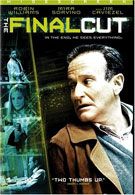A few movies over the years have tried to tackle the science fiction trope concerning the recording of memories, including the not so well received Brainstorm and Strange Days. Robin William's latest The Final Cut tries to handle this common Science Fiction theme on a more personal level. Does it succeed better than its predecessors? The Final Cut is about an alternate reality where one out of 20 people gets a Zoe implant, which records their entire lives through their eyes and ears. Once the implant owner dies, a cutter takes the raw footage and ‘cuts’ it down to a two hour ‘rememory’ that friends and loved ones can watch. This implant is expensive and completely optional, yet a group of anti-implant fanatics protest the practice at every opportunity. This story is mainly about one cutter, Paul Haker (Robin Williams), who due to a childhood trauma spends his days alone working on rememories. Because of his own tremendous sense of guilt, he does not flinch or judge when reviewing some of the nastier memories that come across his desk – like the memories of wife beaters and child molesters.
When the implant of an executive who worked for the company that makes Zoe implants comes across Paul's desk, a member of the anti-implant crowd, Fletcher (Jim Cavaziel), implores Paul to give him the recording, in hopes of finding something bad with which to implicate the company. When Paul sees someone from his past in the recording, he refuses and it puts his own life in danger.
I wanted to like this movie. I like small, thoughtful speculative fiction stories like Gattaca, and wanted to see what this movie would do with its ideas. I felt it fell down because it spent most of the time exploring how Paul's childhood trauma affected him, and did not go into much detail on the ramifications of the Zoe implant on modern society. The movie violates the "show, don't tell" policy all scripts should follow, and it only has one scene where an anti-implant fanatic preaches about how society has gone bad due to people behaving differently because either they are being recorded all the time, or they never know if their actions are being recorded by someone else. No scenes occur in the movie that explore these ideas. For that matter, people seem to behave pretty much as they always did.
Robin Williams does an outstanding job as the distant, introverted Paul, which is good because he's in about 100% of the scenes. His character, unfortunately, is the only one who has any development. Everyone else seems to be there purely to move the plot along, which I could forgive if this movie was more than a character study. The anti-implant people suffer the most from the lack of development because the suspense part of the plot derives from their desire to get a hold of the executive's recording. It almost seems like an afterthought next to Paul's fanatical work and his quest for resolution of childhood conflicts. As a result, the implants themselves seem to be an ambiguous invention - we have no real data to use so we can decide for ourselves whether they are something good or bad. We are merely told they are bad, yet in one scene an implant helps a character to review moments from the past. The disc itself is okay - what is obviously a small production has some care put into it. The sound is sharp in both dialog and music, and the picture does justice to the careful set decoration and Tak Fujimoto’s always-impressive cinematography. Again (not to harp on a point), good things seem to be wasted on an undeveloped idea. On the disc are the usual gang of suspects as far as extras go, including making of featurettes, deleted scenes, theatrical trailers, and a director’s commentary. I found the commentary fascinating because I discovered that my complaints about the movie were deliberate choices by director Omar Naim. I may disagree with what he did with the ideas but after listening to him I can respect his decisions. He should be an interesting director to watch in the future.
I do have one big complaint concerning the packaging and the publicity. The Final Cut is being sold as a thriller and it is not. It can be considered a psychodrama with a few thriller overtones. Consider this a warning for people who are looking for something with suspense and action.
I like small, independent features, especially if they try to deal with speculative ideas about our past and future. It can be frightening to watch Hollywood take a sincere screenwriter's script and turn it into a turgid action effects fest (think Total Recall which isn't entirely fair because that's a fun film despite the mangling of Phillip K. Dick's ideas). In the end, however, The Final Cut would have been a far more complete movie had it punched up some of the ideas it trotted out (or completely jettisoned the anti-implant part of the plot). This one is worth a rental however if you are a fan of Robin William's acting. He shines in what is otherwise an unfortunately flawed movie.

Fans Did Not Hold Back After The Rock Shook Hands With Jake Paul Ahead Of His Fight With Mike Tyson

Andrew Garfield’s Spider-Man Co-Star Recalls The Whirlwind Of Getting No Way Home Questions When Rumors Swirled Around The Movie

While Basically Everyone Broke During Ryan Gosling's Beavis And Butt-Head SNL Sketch, Kenan Thompson Explains Why He Didn’t
Most Popular




